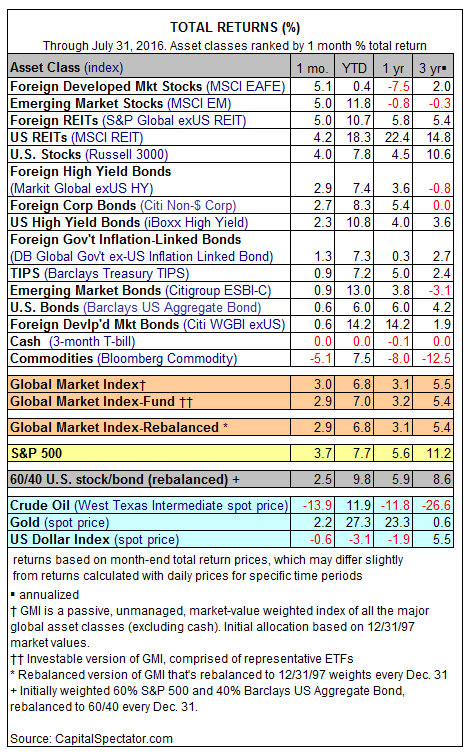Foreign stocks led markets higher in July. Equities in developed markets ex-US (MSCI EAFE) topped the performance list with a 5.1% total return last month, edging out emerging-market stocks (MSCI Emerging Markets), which tacked on 5.0%. July’s third-strongest gain among the major assets classes was also outside the US: foreign property shares (S&P Global ex-US Property), which also popped 5.0% (effectively tied with emerging-market shares).
Meanwhile, June’s bounce in commodities suffered a sharp reversal in July, in part due to renewed weakness in oil prices. The broadly defined Bloomberg Commodities Index shed 5.1% last month, marking the only retreat among the major asset classes in July.

The broad-based rise in prices lifted the Global Market Index (GMI), an unmanaged benchmark that holds all the major asset classes in market-value weights. GMI gained 3.0% in July, posting its sixth consecutive monthly advance and the strongest since March. For the year to date, GMI is ahead by a respectable 6.8%.
A key source of the recent strength in asset prices–equities in particular–may be linked with the crowd’s embrace of a “new valuation paradigm,” notes Tom Stevenson, an investment director at Fidelity Worldwide Investment. “Equity investors are following their counterparts in the bond world in starting to think that maybe it really is different this time.” As he explains in The Telegraph:
The collapse in bond yields around the world to zero and beyond in many cases represents an epochal upward revaluation of fixed income investments. To understand the scale of this, you need only look at a 50-year Swiss government bond that now offers a negative yield. Investors are prepared to tie their money up for half a century for no return at all.
The danger, adds Stevenson, is that chatter about new paradigms tends to arrive on the eve of market peaks. Nonetheless, “on a historical basis, the overall stock market has become expensive, but not relative to bonds,” David Rosenberg, chief economist and strategist at Gluskin-Sheff, tells The New York Times. “People have been looking in the stock market for yield, in the form of dividends, because the bond market has become so expensive and bond yields have gotten so low.”
But there’s a reason for the low bonds yields, and it has everything to do with slow economic growth (and in some cases no growth). Last week’s disappointing news on second-quarter GDP is merely the latest installment on this front. US output increased by an anemic 1.2%, well below expectations and only modestly above the stall-speed 0.8% rise in Q1.
The question, then, is whether the stock market’s relatively attractive dividend payout will remain sufficient compensation for the weak and perhaps deteriorating macro trend? The crowd was satisfied last month, but Stevenson reminds that “investors tend to talk about new valuation paradigms at five minutes to midnight on the stock market clock.”
